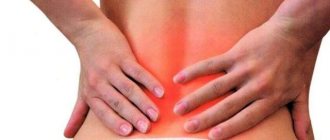What vitamins help with osteochondrosis?
One of the contributing factors in the appearance and progression of osteochondrosis is an unbalanced diet and improperly dosed physical activity. And if degenerative changes are already visible on an MRI of the spine or make themselves felt by back pain, a feeling of numbness or tingling in the extremities, a neurologist can prescribe vitamin therapy for you - injection or drip administration of B vitamins. A regimen of vitamin injections is developed individually depending on your needs , complaints and health status of each patient. So, to maintain muscles and muscle corset, injections of vitamin B6 are given. This vitamin is also needed for the normal functioning of the nervous system, so when there is compression of the nerve roots, it is advisable to use drugs containing pyridoxine. Vitamin B1 injections have a positive effect on the functioning of the entire central and peripheral nervous system. Especially injections of this vitamin are beneficial for improving the functioning of the nerves responsible for nutritional processes in tissues. A neurologist will prescribe a course of vitamin B12 injections for the prevention and treatment of demyelination (the process of destruction of nerve cells and damage to the nerve sheath). In addition to B vitamins, vitamin D is sometimes prescribed for degenerative changes in the spine. Vitamin D or calciferol is a vitamin that determines the ratio of calcium and phosphorus in the body. The positive effects of vitamin D are still being studied. Thus, D-vitamin therapy is even used to prevent the development of cerebral atherosclerosis and slow down the aging of the body. The form of taking this vitamin is through the mouth (orally). These vitamins are produced in oil and water solutions. Thus, by undergoing inexpensive complex treatment with vitamins for osteochondrosis, the patient can reduce or completely eliminate symptoms such as:
- numbness in the limbs;
- tingling or nagging pain in the arms and legs.
| Service | Price | Price | Promotion Price |
| Appointment with a therapist | primary 1800 rub. | repeat 1500 rub. | |
| Neurologist appointment | primary 1800 rub. | repeat 1500 rub. | free after MRI of the spine |
| Orthopedist appointment | primary 1800 rub. | repeat 1500 rub. | free after MRI of the joint |
| Consultation with an acupuncturist | primary 1800 rub. | repeat 1500 rub. | free after MRI of the spine |
| Vertebrologist consultation | primary 2000 rub. | repeat 1800 rub. | |
| Consultation with a chiropractor/osteopath | primary 2500 rub. |
| Service | Price according to Price | Discount | Discount |
| Plasma therapy of the spine or joint | 1 session 4000 rub. free doctor's appointment | 3 sessions 10,500 rub. free doctor's appointment | 5 sessions 17,500 rub. free doctor's appointment |
| Classic acupuncture session | 1500 rub. | ||
| Complex acupuncture session | 2000 rub. | ||
| Pressopuncture session (combination of massage and acupuncture) | 1 session 1500 rub. free doctor's appointment | 3 sessions 4200 rub. free doctor's appointment | 5 sessions 6500 rub. free doctor's appointment |
| Manual osteopathy session | 2500 rub. | ||
| Manual therapy session | 2500 rub. | ||
| Autohemotherapy | 550 rub. | 5 sessions 2500 rub. | 10 sessions 5000 rub. |
| Novocaine therapeutic blockade | 1500 rub. | ||
| Therapeutic paravertebral blockade | 1500 rub. | ||
| The blockade is therapeutic and medicinal, complex (use of several drugs) | 2000 rub. | ||
| Therapeutic intra-articular blockade with diprospan | 2500 rub. | ||
| Joint puncture with removal of synovial fluid | 2500 rub. | ||
| Intra-articular injection of hyaluronic acid (without the cost of the drug) | 2000 rub. | ||
| Novocaine therapeutic blockade | 1500 rub. | ||
| Therapeutic paravertebral blockade | 1500 rub. | ||
| Therapeutic intra-articular blockade with diprospan | 2500 rub. | ||
| Joint puncture with removal of synovial fluid | 2500 rub. | ||
| Pharmacopuncture session (drug at the discretion of the doctor) | 2500 rub. | ||
| Pharmacopuncture session (without the cost of the drug) | 2100 rub. | ||
| Electrophoresis session (without the cost of the drug) | 400 rub. | ||
| Phonophoresis session / Ultrasound therapy procedure (UT) (without the cost of the drug) | 450 rub. | ||
| Magnetic therapy session | 350 rub. | ||
| SMT therapy session (Sinusoidal modulated currents) | 450 rub. | ||
| Vitamin therapy (10 injections) | 4000 rub. free doctor's appointment | 3000 rub. free doctor's appointment | 3000 rub. free doctor's appointment |
| Injections (Vitamins B12) | 800 rub. | 800 rub. | 800 rub. |
| Intravenous administration of drugs | 450 rub. | 5 sessions 2140 rub. | 10 sessions 4050 rub. |
| Intravenous drip administration of drugs (without drugs, 1 bottle) | 800 rub. | 5 sessions 3375 rub. | 10 sessions 6750 rub. |
| Intravenous drip administration of medications (with existing clinic medications, 1 bottle) | 950 rub. | 5 sessions 4050 rub. | 10 sessions 8100 rub. |
| Intravenous drip administration of drugs (without drugs, 2 bottles) | 950 rub. | 5 sessions 4050 rub. | 10 sessions 8100 rub. |
| Intravenous drip administration of medications (with existing clinic medications, 2 bottles) | 1100 rub. | 5 sessions 4700 rub. | 10 sessions 9400 rub. |
| Subcutaneous/intradermal administration of drugs | 250 rub. | 5 sessions 1180 rub. | 10 sessions 2250 rub. |
| Intramuscular administration of drugs | 300 rub. | 5 sessions 1430 rub. | 10 sessions 2700 rub. |
B vitamins in the form of injections
B vitamins can be taken by mouth or orally, as well as parenterally or by injection. In order for the body to take the maximum dose of vitamins, neurologists recommend injecting them. Injections are usually performed in the gluteal muscle. You should know that vitamin injections are somewhat painful, so it is best to do them in a medical clinic. The treatment course of vitamins is 10-20 injections.
If you have such an opportunity, it is best to take vitamins by injection for medicinal purposes, since their bioavailability or absorption by the body is higher when administered by injection.
For neurological problems, it is vitamin injections or droppers that are used, since it is necessary that the maximum possible amount of the drug enters the body and immediately begins to act by combining with blood proteins. As already noted, the most important vitamins for spinal health are B1, B12, B6 and B9. To prevent diseases of the central nervous system with food, a person can consume them if he adds the following products to his diet:
- B1 (thiamine) is found in chicken, liver and grains.
- B6 (pyridoxine) is found in eggs, shrimp, oysters, tuna, ham, chicken, minced beef and lamb, liver, cottage cheese, cheese, and nuts.
- B9 (folic acid ) contains greens, bananas, avocados.
- B12 (cyanocobalamin) contains salmon, liver, lamb, shrimp, sardines, cod, tofu, kelp.
Compatibility of B vitamins in injections
B vitamins are antagonists, therefore, if you are prescribed drugs separately, and not in a complex, ready-made drug, they should be injected every other day. Otherwise, their effectiveness is lost. It is for this reason that B vitamins cannot be mixed in one syringe. Complex solutions work a little differently. Currently, pharmaceutical companies have learned to produce complex preparations of B vitamins, which contain special stabilizing substances that prevent the antagonists in the ampoule from being destroyed.
Characteristics of pantothenic acid
The organic compound called vitamin B5 is an inherently sensitive substance that is not stable to changes in pH and temperature. Even short-term heat treatment leads to a loss of pantothenic acid in the product by 50% or more. A similar effect is observed when vitamin B5 comes into contact with an alkaline and acidic environment. A person whose diet consists primarily of processed foods, baked goods and canned goods runs the risk of experiencing the harmful effects of vitamin B5 deficiency in a short period of time.
That is why it is recommended to pay attention to the daily menu, including those products that contain pantothenic acid in the maximum amount.
Vitamin B12 in neurology
A person should especially monitor the level of vitamin B12 in his body. The fact is that it is an important metabolic substrate for various biochemical reactions in the body. For example, this vitamin serves for the synthesis of red blood cells, enzymes, methionine acid, nucleic acids, and activation of blood clotting. The body takes vitamin B12 from food, and some of it is also produced by special bacteria in the intestines. The body's daily need for this vitamin is very small, but it is essential for the process of hematopoiesis and the healthy functioning of the central nervous system. B12 has the ability to accumulate in the human liver in reserve, so its deficiency is a very serious symptom of diseases such as anemia, damage to nerve tissue or polyneuropathy, stroke due to excess homocysteine in the blood. If a person, for one reason or another, begins to lack vitamin B12, he suffers from systematic weakness, shortness of breath, loss of sensation in the limbs, a limping gait, “cotton leg” syndrome, memory deteriorates, and chilliness in the arms and legs may occur. Often the tongue is an indicator of a lack of vitamin B12 in the body. In a patient in such a situation, the doctor may observe a smooth, bright crimson, varnished tongue with atrophy of the papillae. In neurology, B12 deficiency leads to the fact that the nerve roots of the spine do not receive enough nutrition, and degenerative changes occur in the myelin sheath of the nerves. Due to a lack of vitamin, the membrane is poorly formed, the nerves begin to transmit information incorrectly, that is, they conduct impulses poorly, as a result of which a person loses sensitivity in the legs and arms. The consequences of an acute lack of vitamin B12 can lead to the development of paresis and complete paralysis. These are of course extremes, but still... Insufficient levels of vitamin B12 can also lead to stroke. This occurs due to excess levels of homocysteine in the blood. As a result, the inner linings of the arterial vessels begin to collapse, and cholesterol begins to integrate into these lacunae, forming an atherosclerotic plaque. As a result of this, blockage of first small and then large vessels occurs, thrombus formation and, as a final result, myocardial infarction or stroke.
Previous Next
Properties of Vitamin B5
Pantothenic acid is part of coenzyme A, which is important for the body, which in turn supports the most valuable physiological processes. Without a sufficient supply of vitamin B5, the human body cannot produce hemoglobin. In addition, this organic compound takes part in the relief of allergic reactions.
With a deficiency of vitamin B5 in the body, the process of breakdown and absorption of carbohydrates, fats and proteins is disrupted, which negatively affects the energy balance of the body. Another important property of pantothenic acid is its participation in the formation of so-called good cholesterol, which is necessary for the prevention of atherosclerotic changes in the lumen of blood vessels.
Due to its ability to accelerate the regeneration of living tissues and stimulate the body's defenses, vitamin B5 is widely used in dermatology for the treatment of skin diseases of infectious and non-infectious nature, as well as as part of complex therapy for pathologies of the respiratory system (pneumonia, bronchial asthma, bronchitis).
Vitamin B6 and carpal tunnel syndrome
Sometimes it happens that a person wakes up with a feeling of numbness in the fingers. Neurologists call this condition tunnel syndrome. The cause of this disease lies in the wrist area, where there is a special canal (tunnel) through which the median nerve passes. It innervates the second, first and third fingers of the hand, and thanks to this nerve, these three fingers sense and carry out movements. In people with a certain type of activity, when the load is placed on the hand or the work is accompanied by vibration, the transmission of impulses along the median nerve is disrupted, and the fingers become numb as a result. To treat carpal tunnel syndrome, the doctor may prescribe a course of vitamin B6 injections and physical therapy. Using a needle, a drug containing B6 is injected directly into the tunnel, as a result of which inflammation, numbness and pain go away. Typically, for carpal tunnel syndrome, 3 to 5 injections are given, and such therapy has a very long-lasting effect.
Harm, side effects and contraindications
There are no restrictions on the maximum permissible daily intake of vitamin B5: exceeding the daily intake does not cause side effects. Excess pantothenic acid is excreted from the body through urine, as it is a water-soluble vitamin. Pantothenic acid is found in many foods and is produced in the body itself, so allergic reactions to it do not occur. It is well tolerated by the body at any age, but in some people large doses still cause digestive disorders. In this case, the drug should be stopped.
You should consult your doctor before taking pantothenic acid if you are pregnant, breastfeeding, taking medications, or have digestive problems. There are no direct contraindications for taking the vitamin during these periods, since the harm of pantothenic acid has never been documented, but extra precaution certainly won’t hurt. There are only two contraindications to the use of the vitamin: with hypervitaminosis, which is rare and asymptomatic, and with hemophilia (excess vitamin can increase blood clotting time). In other cases, the benefits of pantothenic acid along with its complete harmlessness make it an excellent dietary supplement for any person.
How to measure your B vitamin levels?
A deficiency of B vitamins can occur due to a number of reasons:
- nutritional deficiencies due to a strict vegetarian diet;
- problems with the absorption of vitamins in the intestines due to atrophy of the mucous membrane or diseases of the gastrointestinal tract;
- helminthiasis;
- Smoking and alcohol also reduce the level of B vitamins in the body.
You can measure your vitamin B12 and vitamin D levels with a simple blood test. A referral for this test can be issued by a physician, or the patient can do it independently at any medical clinic in St. Petersburg that provides laboratory testing services.
Vitamin B17 and cancer treatment
Recently, scientists in search of a cure for cancer are increasingly paying close attention to vitamin B17 (amegdalin), which is found in flax seeds, millet and fruit seeds. Medical debate about the benefits and harms of this substance in the treatment of oncology does not subside. There are a number of studies that suggest that vitamin B17 helps in the fight against cancer. This opinion is shared by a number of medical specialists (American Dr. Krebs and Edward Griffin, Italian Dr. Guidetti), who consider cancer to be a disease caused by a lack of certain elements in the body. They claim that daily consumption of 7-10 apricot kernels prevents the development of cancer. And if cancer has already developed, then with dosed use of vitamin B17, tumor development decreases and the formation of metastases is stopped. But at the moment there are no generally accepted clinical studies confirming the therapeutic effect of vitamin B17 in the treatment of cancer. There are also a number of statements by the American oncologist Lester M Crawford that there is no scientific evidence that drugs with vitamin B17 (for example, laetrile) can cure cancer. Moreover, he believes that B17 is a dangerous compound that contains the deadly component cyanide. But, despite the skepticism of official medicine about the ability of vitamin B17 to help treat cancer, doctors do not give up attempts to study B vitamins as a promising group of substances in the treatment of cancer. Now active experiments are being conducted with vitamin B1.
Author: Telegina Natalya Dmitrievna
Therapist with 25 years of experience
>
Natural springs
If there is a lack of pantothenic acid in the body, it is enough to diversify your daily diet with food ingredients such as soybeans, brewer's yeast, green peas, apples, buckwheat, rice bran, white wheat bread, peanuts, champignons, cocoa powder, barley, flax seeds , cauliflower, asparagus, avocado, dates, dried apricots, broccoli, rye bread, garlic, pumpkin, potatoes, onions and tomatoes.
Particular attention to the listed ingredients should be paid to people who are professionally involved in sports, as well as those people who are prone to individual episodes of developing colds.
You can buy vitamins in Odintsovo at any time. It is important to remember that a diet rich in carbohydrates impairs the absorption of pantothenic acid. Canning and heat treatment of products containing vitamin B5 leads to a loss of the volume of this element in an amount of 50% or more of the original amount. During the freezing process, the amount of vitamin B5 in food ingredients is reduced by 34%.
Reviews
11/02/2018 Clinic with a normal nurse. I was given intramuscular injections. No blood, no vein problems.
T.H.
01/26/2018 The plasma therapy procedure helped a lot. The hip joint did not give rest either day or night. It was painful to walk, sit, and stand up. After five sessions I feel almost healthy. Special thanks to Dr. Usenko N.S.
Bestuzhev
09/04/2017 Many thanks to Dr. Shogenov R.K. The plasma therapy procedure put me on my feet, my back pain went away. I wish you health and prosperity.
Zaitseva
Read all reviews
Where to get injections of B vitamins in St. Petersburg?
MRI and ultrasound center RIORIT
Area:
Kalininsky
Metro:
metro station Grazhdansky Prospekt, metro station Devyatkino, metro station Prospekt Prosveshcheniya
Address:
St. Petersburg, Kalininsky district, st. Rustaveli, 66 lit. G
Telephone:
Equipment:
Siemens, open type
Schedule:
Around the clock
Vitamin B deficiency
Vitamin B9 (folic acid) is a water-soluble vitamin. It is especially necessary for women during pregnancy for the development of the fetus. A normal amount of this vitamin reduces the possibility of intrauterine defects.
read more
Vitamin B deficiency
Vitamin B1 (thiamine) is a water-soluble vitamin, one of the most famous of the entire B group. Vitamin B1 deficiency is quite common because it is heavily consumed by the body. This is an essential vitamin that is involved in energy metabolism. It normalizes the activity of the central nervous, cardiovascular and endocrine systems.
read more
Vitamin B deficiency
Vitamin B6 (pyridoxine) is a water-soluble vitamin. In pharmacies it is often sold in the form of ampoules with a solution. The fact is that this vitamin, like vitamins B1, B12, C, can be isolated and made into a solution. It is worth noting that this vitamin is not synthesized by the body; it comes only from the outside.
read more
Recommendations for use, dosage, daily intake
The norm of vitamin B12 for women is 2.4 mcg per day. The need for the substance increases in girls who are pregnant or breastfeeding. For pregnant women, the daily dose of B12 is 2.6 mcg. During lactation it corresponds to 2.8 mcg. According to some data, during puberty, women need from 2.3 to 2.9 mcg of the substance per day. After 18 years, this requirement increases to 3 - 3.4 mcg. Women who are at risk are recommended to take up to 4 mcg of the substance. Your doctor will help you determine your individual dose of the drug. Nutritional supplements in any form should be taken 2 times a day.






